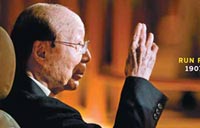Galas hit by frugality push
By Shi Jing in Shanghai ( China Daily ) Updated: 2014-01-09 07:10:06The tightening policy is not good news for Cao Rui, who founded her own gala organizing company, Beijing Shichuang Co Ltd, in 2013.
 |
| Found in translation |
 |
| Movie mogul Run Run Shaw, 107, dies in HK |
"Usually companies like to have the local government sponsor the contests or galas. Only in this way can they make the scale of the gala bigger and make the gala a reality," Cao says.
She says companies are more sensitive since the notice urging more frugal galas. It is difficult to seek sponsors or advertisers, she says. "People nowadays are less willing to hold galas, which means less income to us."
With a whole team of actors and actresses, as well as a group of professional stage lighting designers, Shanghai Xintang PR Event Consulting Co Ltd has long experience in organizing galas or parties. The price it charges for one gala varies from 70,000 yuan to 500,000 yuan.
Xintang's marketing manager, surnamed Han, says companies or institutions usually come to them two or three months before holding a gala, which is especially necessary around holidays.
Despite the tightening control on galas, Xintang's business was not much affected, Han says. She says they have received about six orders so far, all of which are for galas to be held in January.
Shao Beibei has been working as a gala hostess in Shanghai for more than four years. Although most of the galas she will host around the New Year are those from multinational companies, which are less affected by the central government's policies, Shao has noticed some changes. "Some companies still would like to invite some government officials to attend their company's galas or ceremonies. But all the officials are trying to be low-profile these days. They simply come, give a short speech and quickly leave the venue. They were not like this in the past," she says.
|
|
|
|
|
|
|
|





















 Raymond Zhou:
Raymond Zhou: Pauline D Loh:
Pauline D Loh: Hot Pot
Hot Pot Eco China
Eco China China Dream
China Dream China Face
China Face





